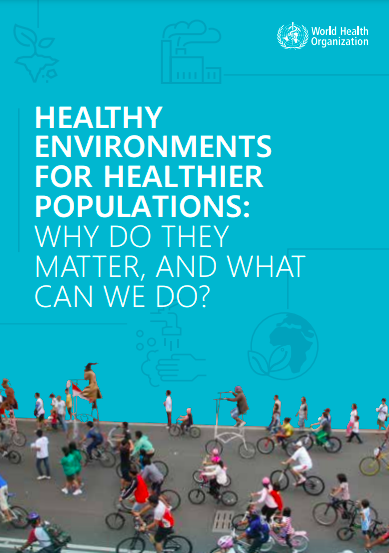
Currently Featuring
Environmental change and the resulting degradation of air, water and food systems has a direct impact on human health around the world. Research has found that countries with a high level of environmental degradation experience lower life expectancy and higher infant mortality rates.1 1“Environmental
Changes to the environment can influence the frequency and intensity of hazards, as well as our exposure and vulnerability to these hazards. For instance, deforestation of slopes often leads to an increase in landslide hazard, while removal of mangroves can increase the damage caused by storm surges.
These environmental changes are often driven by a combination of climate change, population growth and economic development, while their impacts are felt most by those who do not benefit from the wealth generated by overconsumption.
Children are especially impacted by environmental change. Some 26% of childhood deaths and 25% of the total disease burden in children under five were attributed to environmental exposures in 2012 – including from infectious and parasitic diseases and neonatal and nutritional conditions, as well as injuries and noncommunicable diseases.
At the local level, reducing environmental degradation and ecosystem decline requires acknowledgement of the links between unsustainable development and poverty. Communities are often driven to degrade their environment as a short-term coping mechanism; for instance, surviving a failed harvest by selling wood. Strategies for reducing poverty by investing in environment-sensitive development should therefore support efforts to reduce disaster risk and enhance resilience.
A number of approaches and tools in environmental management, including environmental impact assessments, now take explicit account of disaster risk, while increasing investments are now being made in ecosystem approaches to disaster risk management at all levels.
At the policy level, there are common elements in successful policies across the regions, which extend to managing climate change. Tools such as integrated water resources and coastal zone management; the removal of environmentally harmful subsidies, especially on fossil fuels and/or carbon taxes; renewable energy, marine protected areas, and cross-boundary biodiversity conservation, are all examples of policies used in more than one region, but customized to each context. Formal, robust, and well-established governance mechanisms and structures at all governance levels are a necessary foundation for successful implementation of environmental policies.
Innovative schemes including ‘green infrastructure’ projects that maximize ecosystem services, including the reduction of flood risks, have been implemented. For example, in Napa Valley, California, green infrastructure in the form of wetlands creation and protection as well as floodplain restoration is combined with a set of grey infrastructure investments such as conventional rock and concrete flood protection. Mangrove conservation and restoration is another area where considerable efforts have been invested, though the results are still mixed.
Research
EN
Research
EN
Research
EN